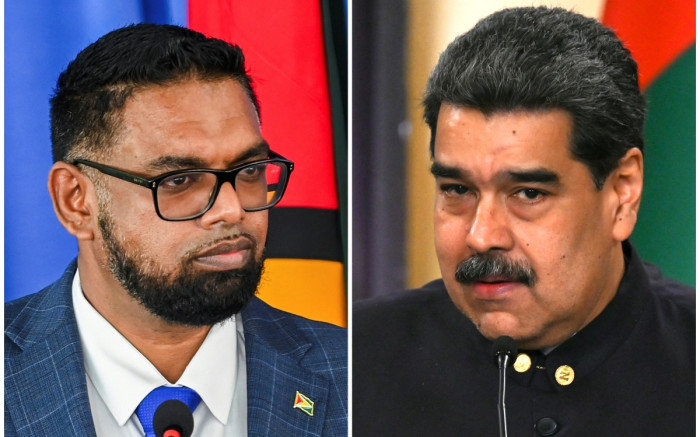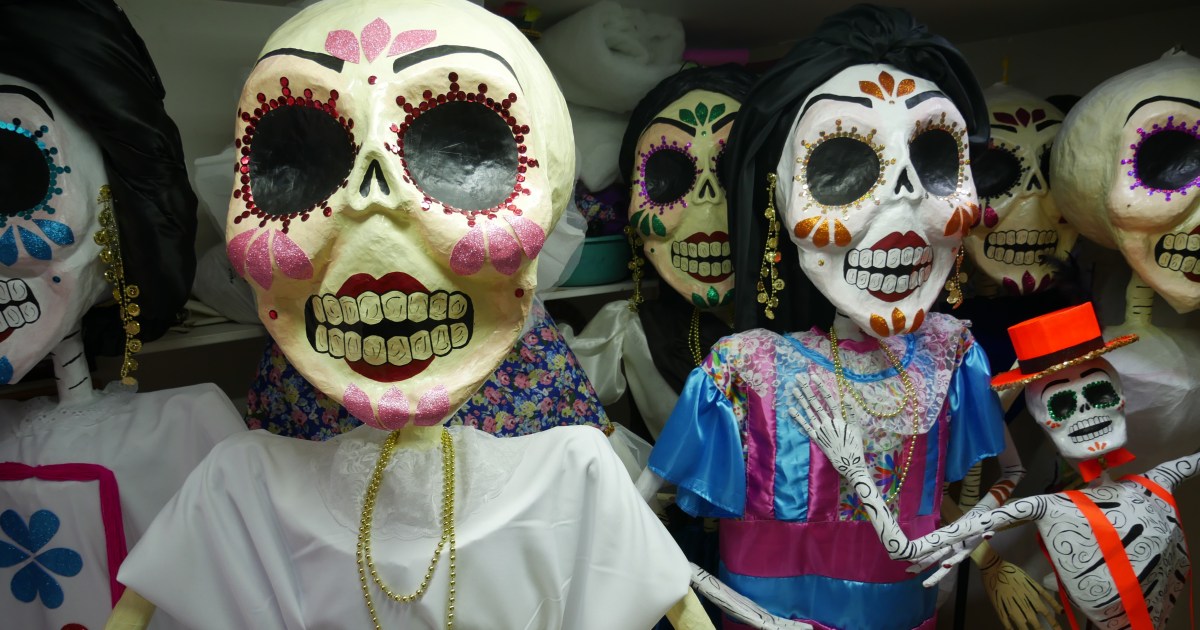
Irfaan Ali of Guyana and Nicolas Maduro of Venezuela shook hands after a two-hour meeting and agreed that they would “under no circumstances threaten or use violence against each other.”
This image combination, created on December 12, 2023, shows Guyana’s President Irfaan Ali (l.) on July 6, 2023 and Venezuela’s President Nicolas (r.) on November 2, 2022. Image: AFP
CARACAS, Venezuela (AP) — The presidents of Venezuela and Guyana pledged not to resort to violence to resolve a long-simmering — and recently reheated — territorial dispute over the oil-rich Essequibo region after direct talks Thursday, a joint statement said.
Venezuela’s Nicolas Maduro and Guyana’s Irfaan Ali shook hands after a two-hour meeting in the Caribbean island nation of St. Vincent and the Grenadines.
The two sides agreed that they “will not threaten or use force against each other under any circumstances,” the statement said.
Prime Minister Ralph Gonsalves of St. Vincent read out the three-page statement, which included concrete measures to ensure that tensions on the ground do not suddenly escalate.
But neither Venezuela nor Guyana agreed on the proper global jurisdiction to resolve the territorial dispute over Essequibo, which accounts for about two-thirds of Guyana’s territory.
Maduro, who is trying to win his country’s support with his territorial claims, described the summit as a triumph.
“Excellent day of dialogue!” Maduro posted on X, formerly Twitter. “We made it!”
The two sides vowed to resolve the dispute “in accordance with international law,” but noted that while Guyana believes the International Court of Justice is the proper jurisdiction over the matter, Venezuela has refused to recognize the body in the matter .
Gonsalves said that both Georgetown and Caracas are “committed to the pursuit of good neighborliness, peaceful coexistence and the unity of Latin America and the Caribbean.”
The statement said the two leaders had agreed to meet again in Brazil within three months, with leader Luiz Inacio Lula da Silva appointed as the interlocutor for the dispute.
Controversial referendum
Guyana’s president left the summit declaring that his country would not give up its sovereignty over the region’s oil fields.
“Guyana has every right… to facilitate any investment, any partnership… the issuance of any license and the granting of any concession within our sovereign space,” Ali said.
Although Caracas has long laid claim to Essequibo, it is stepping up its rhetoric after Guyana, which has ruled the territory for more than 100 years, began issuing licenses for oil companies to operate there.
The meeting came after months of escalating discord that had raised fears in the region about a possible conflict over the remote 160,000 square kilometer area.
Maduro’s government held a controversial referendum on December 3 in which 95% of voters supported declaring Venezuela the rightful owner of Essequibo, according to far-left government officials.
He has since launched legal maneuvers to create a Venezuelan province in Essequibo and ordered the state oil company to issue licenses to extract crude oil in the region – moves that Ali called a “grave threat to international peace and security.”
Guyana has taken the case to the UN Security Council and reached out to military “partners,” including the United States, which has been conducting joint military exercises in Essequibo.
“The land border between Venezuela and Guyana should be respected unless or until the parties reach a new agreement or a competent legal authority decides otherwise,” Secretary of State Antony Blinken told Lula between the two Thursday, according to a summary of a call at the Brazilian Foreign Ministry .
Lula supported a peaceful solution and warned Maduro against “unilateral actions that could escalate the situation.”
Brazil, which borders both countries, has also increased its troops in the region.
Oil, a point of conflict
The decades-long dispute intensified after ExxonMobil discovered oil in Essequibo in 2015, helping give Guyana, with its 800,000 residents, the world’s largest crude oil reserves per capita.
The Venezuelan government’s anti-imperialist rhetoric has led it to accuse Ali of being “a slave” to ExxonMobil.
On Monday, Venezuelan Foreign Minister Yvan Gil told reporters there could be talk of “cooperation on oil and gas matters.”
Gil pointed to the Petrocaribe agreements, under which Venezuela supplies crude oil to Caribbean countries at preferential prices, as well as gas agreements with Trinidad and Tobago.
He said these were “concrete examples” that “could serve as a basis for future agreements with the Cooperative Republic of Guyana.”
The dispute has embarrassed other South American nations.
Argentina, Brazil, Chile, Colombia, Ecuador, Paraguay, Peru and Uruguay called in a joint statement for “both parties to negotiate to find a peaceful solution.”






Recent Comments